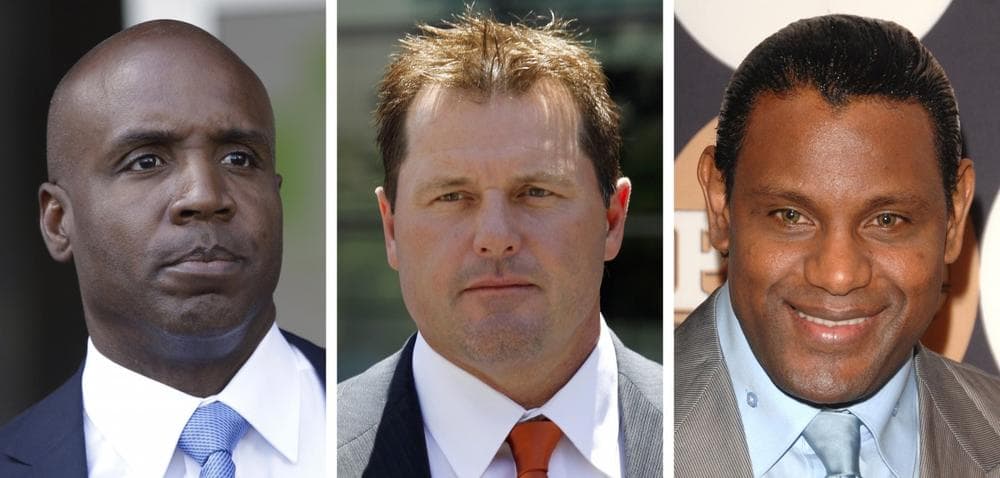Advertisement
Football's Double Standard
On Sunday, the New England Patriots won another AFC East title, the team’s ninth in the last 10 years. The now obligatory T-shirts and hats were distributed in the locker room after the 23-16 victory over the Miami Dolphins.
That the Patriots won the game with two players serving suspensions for violating the NFL’s substance abuse policy went largely unnoticed. That they won the game with a player having already served a substance abuse suspension this season — a player the Patriots acquired in a trade while he was serving said suspension — also did not seem to matter.
Why is it that sports can basically shrug off drug violations in football and go to DEFCON 5 when the alleged perpetrator is a baseball player?
Defensive end Jermaine Cunningham and running back Brandon Bolden missed the game in Miami due to the league-imposed suspensions. Aqib Talib started at left cornerback and was in on three tackles. Cunningham was suspended the Monday before the Miami game. Bolden has served his four-game suspension and is eligible to return for next week’s game against the Houston Texans. Talib was serving a suspension while a member of the Tampa Bay Buccaneers
According to the New York Times, they are three of a record 21 players suspended in 2012 for substance abuse violations, nine more than 2011. The NFL does not stipulate what banned substance is involved; it is prohibited from doing so in the league’s collective bargaining agreement.
This is not to single out the Patriots for being the NFL equivalent of “Breaking Bad.” Bill Belichick is no Walter White. After the Cunningham suspension, Belichick said, “I address the team every day, we talk to them on a regular basis. Unfortunately, sometimes on these things people make mistakes. Everybody is accountable for them. I think those situations are unfortunate. Neither one of them needed to happen, they weren’t that important, but they were violations so they are what they are.”
Nonetheless, look for Belichick to welcome Cunningham and Bolden back to the team when they are eligible. Cunningham has been an important player this season, participating in all 11 games. Bolden, a rookie, was a rotation player as a running back while also playing on special teams.

Meanwhile, two days after Cunningham was suspended, ballots were sent out to members of the Baseball Writers’ Association of America for the 2012 Hall of Fame. Three players eligible for the first time — Roger Clemens, Barry Bonds and Sammy Sosa — all had been linked to performance enhancing drugs. Although the ballots are not due for a few more weeks, an early survey by the Associated Press indicated none of the three, who would be slam-dunk Hall of Famers without the drug cloud, were going to be elected.
Why is it that sports can basically shrug off drug violations in football and go to DEFCON 5 when the alleged perpetrator is a baseball player? Is it because we can almost relate to the need for something in football because of the violent, barbaric nature of the game? Is it, dare we say it, part of the cost of doing business?
Or is it because we haven’t seen the equivalent of a Clemens, Bonds or Sosa (not to mention Mark McGwire) be one of the culprits in football?
The most recent “star” to be suspended for violating the NFL’s substance abuse policy is probably Houston Texans linebacker Brian Cushing. He was named the Defensive Rookie of the Year in 2010 — and then was suspended for using hCG, a fertility drug. Five days after the suspension, sports writers took a re-vote on Cushing’s rookie award. He still won, though not as handily as he did the first time.
It may be explainable — if not justifiable — by what drives the two sports.
The San Francisco Giants, on the other hand, did not welcome back one of their top players after he violated baseball’s drug policy and served a 50-game suspension. Even without Melky Cabrera, one of the team’s leading hitters, the Giants still won the World Series.
It’s your basic double standard; We accept such things in football but recoil at them in baseball. But it may be explainable — if not justifiable — by what drives the two sports. Football by and large is a game where success is defined by what the team achieves than what a single player does.
Baseball, on the other hand, is a game defined by what individuals do, whether it’s home runs, no-hitters, stolen bases or any number of other individual based stats. We know who is the home run king (although the current one is the tainted Bonds). We know Nolan Ryan threw seven no-hitters. We are upset when we realize a performance enhancing drug may have helped an individual hit more home runs (Bonds, Sosa, McGwire) or win Cy Young Awards when he was supposedly done (Clemens.) It’s cheating. So they’re not going to go to Cooperstown.
It’s cheating in football, too. But there is no public outrage. Maybe there will be at some point if a marquee player gets caught, but the attitude today seems to have been summed up by a caller this past week to a radio talk show. He suggested that Cunningham’s real problem was not the banned substance, but the fact that he failed to use a better masking agent. He was kidding. I think.
Related:
This program aired on December 4, 2012. The audio for this program is not available.